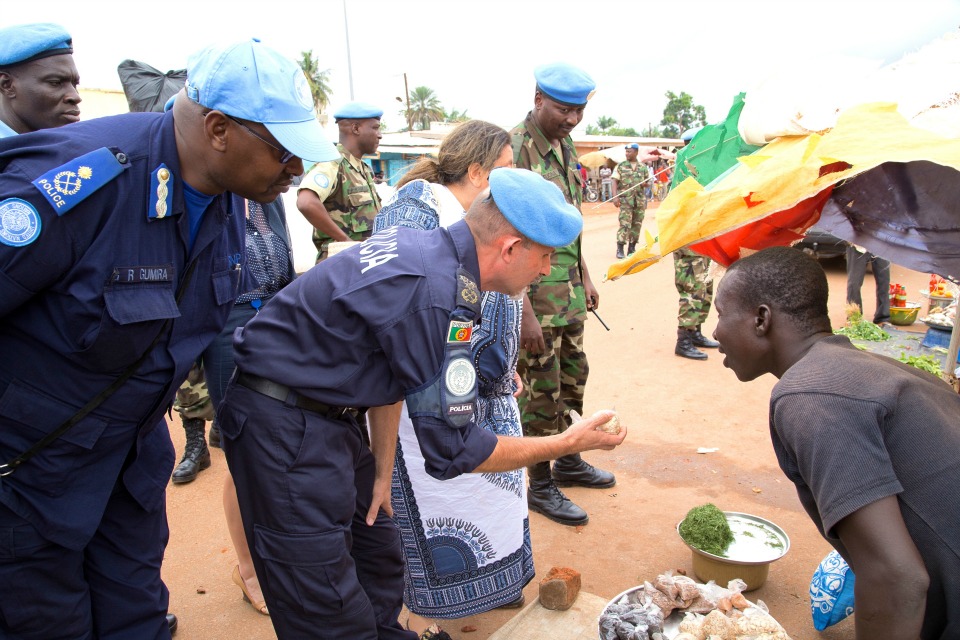"At its best, UN Peacekeeping can save lives, rebuild communities and replace fear with hope."
Statement by Ambassador Matthew Rycroft of the UK Mission to the UN at the Security Council Meeting on Maintenance of Peace and Security

Let me begin with some comments on the situation in Mali. Like others in this Council, I have been shocked by the hostages crisis in Bamako today. I express solidarity with the Malian government and its people in their fight against terrorism. I offer my sincere condolences for the victims of this attack and deep sympathy for the fear and injuries inflicted on those held hostage. We commend the swift and decisive action by the Malian Security Forces, supported by French Forces, and by the UN Peacekeeping Operation MINUSMA. The Security Council will remain closely engaged in the stabilisation in Mali, through MINUSMA, and the government and people of Mali have our full support at this difficult time.
I would like to thank the Secretary-General, not just for his briefing but also for his initiative in setting up the Peace Operation Review and his follow-up to that review, including through this meeting of the Security Council. As we have heard today, the Council needs to play a significant role in empowering Peace Operations if we are to meet the challenges of current and future conflicts.
For the United Kingdom, this means improving the way the Council mandates missions and changing how we discuss the work of the UN in fragile and conflict-affected states.
At its best, UN Peacekeeping can save lives, rebuild communities and replace fear with hope. But not all UN Peacekeeping is as good as the best. In particular, the UN must respond robustly to all allegations of sexual exploitation and abuse. So like New Zealand and others, we support the Secretary-General’s recommendations and stand ready to help implement them.
On this, and all other issues related to Peace Operations, it is time now to stop talking and to start taking action to make a real difference. Let me make three practical suggestions on how we can do so, focusing on the UN Mission in South Sudan, UNMISS, as an example.
First, we need better phased or sequenced mandates, with more prioritisation of mandated tasks. The Council initiated this in MINUSCA’s mandate in the Central African Republic, and I hope we can continue by looking at greater prioritisation and sequencing of tasks when we come to renew UNMISS’s mandate next month. We must set a clear direction for UNMISS as it evolves over the coming months to support the peace agreement.
We will, of course, be guided by DPKO’s technical assessment. We should also take this opportunity to think hard about UNMISS’s priorities, how they are sequenced, how best to expand the mission so that it delivers what is needed on the ground.
Second, we need to get our political messaging right. When this Council speaks, it is the voice of the international community. And we must use that voice to support the work of our missions across the globe, as well as the peace processes that we and others lead. We must make use of the all tools at the Council’s disposal to speak out when there are repeated violations of Status of Forces Agreements. And we need to keep in mind the impact our political messaging can have in preventing conflict and in responding to situations of emerging conflict.
This means using press statements, resolutions, Council visits to the region to send clear and unambiguous messages. And yes, it means being prepared to impose sanctions and arms embargos where appropriate. It also means that if States demonstrate and deliver a firm commitment to peace, we should respond to that commitment with equal determination.
Finally, the UK believes we need more feedback and better analysis to improve our ability to protect civilians. To inform the phasing of a mission, the Council needs to be provided with evidence of how the mission is fulfilling its tasking and why there are shortfalls. This should include whether or not the current mission configuration and military components are sufficient to deliver.
All of this requires greater strategic analysis and planning at earlier stages by the Secretariat. We fully support the Secretary-General’s proposal to enhance these capabilities and to engage with the Security Council at an earlier stage.
We can put this into practice by thinking about what tools UNMISS needs to protect civilians better; - What additional or different, police or military capabilities are required?
- What levels of “good offices” are needed to support parties’ political commitment to the ceasefire so as to reduce the threat of violence against civilians?
Engaging with the local community will be also vital; putting people at the centre of what we do and really thinking about what the UN Mission can do to deliver for those who live there. We should listen carefully to the local community about how they can support the work of the mission.
So I look forward to continuing these discussions as we approach the mandate renewal for UNMISS in the coming weeks. If we take these steps and more, I believe we can make a tangible improvement to the work of both UNMISS and UN Peacekeeping more broadly, and in doing so, we can help improve the lives of people in South Sudan and beyond.
Thank you.